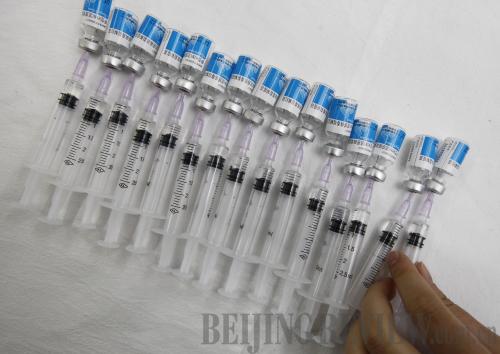|
Breaking the bottleneck
 |
|
HEALTH INSURED: Chinese-made Influenza vaccines are ready for students in Shanghai on November 10, 2009 (PEI XIN) | Also on March 1, a new Goods Manufac-turing Practice (GMP) code adopted by the SFDA took effect. In line with international standards, the new code put in place stricter requirements for vaccine production to ensure production of vaccines of assured quality.
Meanwhile, the WHO held a training session on March 1 for Chinese vaccine manufacturers about pre-qualification reporting procedures.
Facing WHO's high standards and strict requirements, many Chinese manufacturers expressed their worries.
"Under the current situation, I'm afraid few vaccine producers in China can meet WHO's requirements," an executive with a private vaccine company from Ningbo, east China's Zhejiang Province, told Century Weekly.
Liu with Sinovac Biotech Ltd. said such worries highlighted Chinese vaccine producers' poor technology and the quality problem of Chinese vaccines.
For a long time, Chinese vaccines have been criticized for faults in the links of production, circulation, utility and supervision.
In December 2009, a total of 215,800 units of rabies vaccines made by Jiangsu Ealong Biotech Co. and Hebei Bioforwell Co. from July to October 2008 were found with quality problems. Then the two companies' production licenses were revoked. They were also fined a combined total of more than 30 million yuan ($4.57 million).
In March last year, Beijing-based China Economic Times said improperly stored vaccines in north China's Shanxi Province killed several children and sickened dozens of others who were vaccinated between 2006 and 2008.
"Chinese vaccine producers must put more effort in quality supervision to ensure Chinese vaccines go around the world," said Liu.
Another challenge is Chinese vaccine producers still lagged behind large foreign counterparts in terms of technology, Liu said.
According to Wang Jing, Marketing Manager of Tianjin Tasly Jinna Biotech Co. Ltd., most Chinese vaccines are imitations of foreign products and some new vaccines, such as pneumococcal vaccine and rotavirus vaccine, are still in the laboratory stage.
"Regarding the introduction of foreign technologies, foreign vaccine producers are only willing to put the bottling lines in China," Wang said.
Besides, there exist problems of decentralized investment and redundant development in Chinese vaccine industry, according to Wang.
Hence, he suggests strengthening cell and virus cultivating technology and biological purification technology.
In recent years, Chinese food and drug authorities and vaccine producers have realized the problems and started to strengthen the industry's mass production and technology integration.
In July 2009, the National Vaccine and Serum Institute and the National Institute for the Control of Pharmaceutical and Biological Products launched a research center for new-type vaccines in Beijing.
In November 2010, the National Engineering Research Center for the Combined Vaccine was approved by the SFDA.
In its 2010 research plan, the Changchun Institute of Biological Products of the China National Biotech Group said it would focus on mass producing freeze-dried Hepatitis A live vaccines, bioreactors' mass cultivations, producing technologies of freeze-dried rabies vaccines and inactivated Hepatitis A vaccines.
"With these efforts, China may take a place on the international market in the near future," Wang said.
According to Liu, Beijing Sinovac Biotech Ltd. has worked out a "going global" strategy and is preparing to go through the WHO's pre-qualification process.
"We have the confidence to get the WHO's pre-qualification for our influenza vaccine within 2013," Liu said. | 